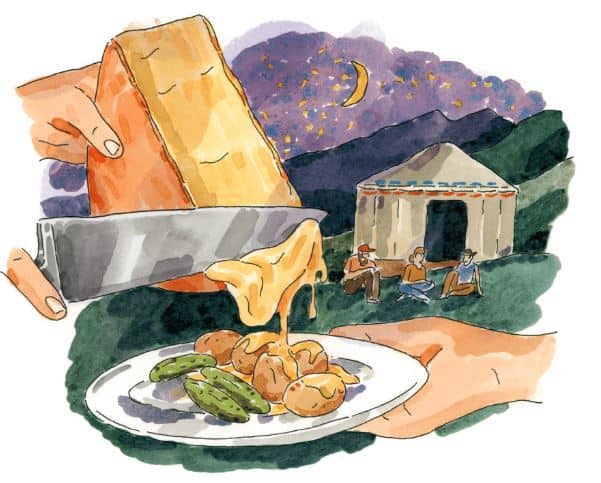
Three hours before the toaster was illuminated, I had never even heard of raclette. It had been a long day—of harvesting, washing, transplanting, and cultivating organic vegetables in 98-degree heat, surrounded by smoke that had settled into the Sierra Nevada foothills from a nearby forest fire—and when work was finished, I found a text from my neighbor Blair. Her husband had a friend on his way from San Francisco with a wheel of cheese, she said, inviting us farmers to enjoy a “unique cultural experience” in celebration of Swiss National Day.
I didn’t have time to google raclette since I had to drive into town to pick up a few bags of rolled barley for the pigs. After descending through a corridor of pine and oak, I hopped on the freeway and called my mom, asking her to look it up for me.
“There’s something you have to do to it,” she told me, with the chuckle of someone who knows something that you don’t. “I’m not going to tell you, though. You’ll see.”
I’m still a cheese amateur, so I had a few fears. Raclette: Was it that maggoty cheese? Was it some laborious, time-consuming process that alchemically transformed the cheese into another substance?
As an Ohio transplant, every day in California is a unique cultural experience. So is every minute spent with Blair, her husband Stuart, and their two young children, homesteaders who live in a yurt on the farm. On Mondays, Blair spends about an hour teaching us American Sign Language so that we can better communicate with her and her family, who are all deaf. Some of us sign better than others, and even the most skilled of us have conversational skills equivalent to a hearing toddler—but there’s a certain satisfaction in signing words correctly with our neighbors instead of relying on our phones to type words or pads of paper to write them down.
It turns out that I had nothing to fear. When I walked into the yurt, I found Dana, the friend from San Francisco, who had worked with Stuart on a dairy farm in Gimmelwald, Switzerland. He was busy peeling garlic, and as we stuffed the garlic into olives he explained the process: We were going to fill our plates with pork, pickles, and potatoes, and then he was going to scrape melted cheese all over them. My stomach let out an audible grumble when I found out we would have to wait an hour or two for the heat to subside before our feast. Dana hung a flag with the Gimmelwald coat of arms, posed for a few photos with Stuart in front of it, and then fired up the toaster.
There we were: a strange bunch of farmers, homesteaders, and a chef, having our own raclette party in a fly-riddled yard outside a yurt on a farm in the foothills of the Sierra Nevada. It’s safe to say we made up our own language, scraping together bits and pieces of English, ASL, French, and the occasional Swiss-German dialect that Dana used to punctuate his dutiful raclement, all under the conduction of Diane, a relative of Blair’s. Fluent in almost all of those languages, she signed each of the words that she spoke, and interpreted interesting parts of the conversation for the deaf among us.
But in the brief moments before the cheese cooled and congealed, there was only silence, occasionally interrupted by the sounds of forks and knives scraping against plates and nonsensical interjections of delight.




This was one of the funniest. and most heart-felt short stories in the last year! Thanks so much for making us both laugh.
So glad you liked it, Margaret!